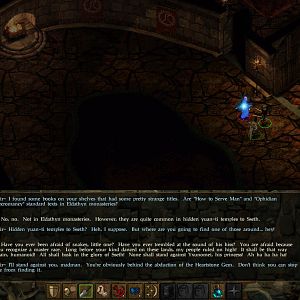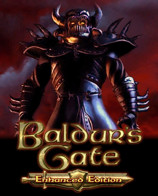-

- Forums
- Chatrooms
- Gallery
- Gameplay Videos
- Upload
- Articles
- Mod Reviews
- Shop SP: Games, Movies, Books

|
Sorcerer's
Guide to Kits
|
Assassin
In short: Assassins are trained killers whose services are for hire. The Assassin will have the disadvantage of having fewer points to distribute for thieving skills than the normal thief. To make up for this, he is able to create and use poisons, and is more adept at combat than the thief. In Baldur's Gate II Assassins must be of any evil or chaotic neutral alignment.
Requirements: Strength: 12, Dexterity: 11, Intelligence: 11
Description: In any reasonably corrupt culture, there are those who wish to eliminate someone whose very existence stands in the way of their plans. To serve them there are Assassins, trained killers whose services are for hire. In the AD&D 2nd Edition Players Handbook, the idea of an Assassin, a hired killer, has been divorced from any particular character class. Indeed, a character can be of any class and still be an Assassin, this thief kit simply shows how a thief can be converted into an efficient discreet killer. Characters of other classes still can (and often will) be Assassins, so it would be best not to let down one's guard.
Thugs and Bounty Hunters may be seen as close relatives of the Assassin. It is important, then to understand their differences, and what makes their roles distinct. Thugs typically serve as crude muscle, using bullying and intimidation. The Assassin, on the other hand, thrives on anonymity, on surprise - on his victim not even realizing that he is a target until it is much too late. A clever Assassin might never be seen by his victim. Here, too the Assassin differs from the Bounty Hunter, for the hunter often seeks his quarry alive, and typically must bring back his prey (or the corpse thereof) as proof of his project's success.
The Assassin has the ability to coat his weapon in poison once per day/ 4 levels. When he selects this ability, the next hit he makes with a weapon will inject poison. The poison deals out 6 damage every 6 seconds, for 30 seconds. A saving throw lowers the damage to just 6 damage (and no damage thereafter). The Assassin gets a +1 bonus to hit and damage with weapons that he uses. An Assassin also has a better backstab modifier that the Thief. At 17th level the Assassin does ×6 to damage, and at 21st he does ×7 to damage.
Most Assassins are of evil alignment. However, it is conceivable that one might be of neutral (but not good) alignment. Player Character Assassins if they are permitted in the campaign best fit this rare neutral description. A PC might be an agent of some monarch, paid to arrange the discreet demise of those who threaten the kingdom's safety. While this is certainly not good (in the moral sense), the character might regard this as a justifiable evil because of the deaths the action prevents by obstructing rebellion, invasion, or whatever.
Many Assassin thieves belong to guilds. The guilds use them to serve their own needs, and act as intermediary for outsiders who wish to take out a contract on someone's life.
Weapon Proficiencies: Because of their specialization in the art of killing, Assassins, unlike thieves of other kits, are permitted the use of any weapon. An Assassin often selects one favoured weapon, such as the garrote or serrated dagger (or even something exotic, such as the blowgun darts with an exotic insect poison from a distant jungle), to use for his killings. If the Assassin achieves infamy, the marks of this weapon may become known as a sort of 'calling card'.
Armor/Equipment: Assassins are familiar with and make frequent use of a wide array of deadly devices. If the DM permits, poison is also available and frequently used by the Assassin. The Assassin may purchase poison (expensive and usually illegal) or attempt to manufacture or extract it himself (which can be dangerous as well).
Special Benefits:
Because of their training and experience with the use of poisons, Assassins also can identify poisons used by others. The base chance of doing so is the Assassin's level multiplied by 5%. Assassins with Intelligence of 13-15 get a +5% bonus on the attempt; 16-17 a 10% bonus, and 18, +15%. Further adjustments depend on how the Assassin attempts the identification sight, smell, taste or symptoms. Sight means examination of the poison or poisoned article. Many poisons have a distinctive appearance, or they may have corrosive or discolouring effects on metals, food, etc. Identification by sight has a -20% modifier. Its advantage is that the Assassin need not worry about poisoning himself in the process.
A poison may also be identified by its odor. This carries a -15% penalty. Furthermore, if it is an ingested or contact poison, there is a 10% chance that the Assassin will be affected by the poison, though at half strength.
Taste is fairly reliable, if dangerous method of identifying a poison. It carries a -5% penalty. After dabbing a tiny bit on his tongue, the Assassin spits it out. There is still a chance that the poison will affect the Assassin: 25% for injected poison, 75% for ingested and 100% for contact.) The poison's effects if any, are half strength (see above).
The most certain way of identifying a poison is by its symptom (no penalty on the attempt) The drawback of this method, is of course that you need a poisoned character to examine.
An Assassin with herbalism proficiency gains a +5% identification bonus because of his knowledge of toxins extracted from plants. An Assassin with the healing proficiency gets a +10% bonus in any case. These bonuses are not cumulative.
An attempt to identify a poison takes one round: be sure to keep track of time elapsed and the onset time of the poison. If one method of identification fails, the next may be tried. If none of the four produce an answer then the poison will remain a mystery to that Assassin (the Assassin could attempt identification again, after he's gained an experience level, but this is not normally of any help).
Identification of a poison also means knowledge of its antidote (if one exists); it does not mean that the antidote is available, however. However, an Assassin with herbalism proficiency may attempt to make an antidote from scratch.
Special Hindrances:
Because of the time they spend on weapons and poisons, Assassins advance more slowly in thieves' skills than thieves of other kits. They start with only 40% discretionary points to allocate at 1st level, and with each level gained, they receive only 15 points to distribute among the skills. Assassins are generally feared and shunned. Therefore, an Assassin suffers a -4 reaction penalty with non-evil NPCs who are aware of his profession.


